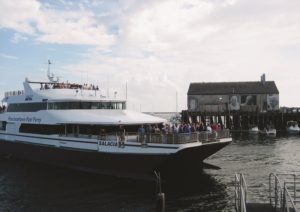Just as I was about to sail away for the season, the news arrived that the National Oceanic and Atmospheric Administration (NOAA) is considering some substantial changes to the regulations regarding the critically endangered North Atlantic right whale. I have had a close look, and, of course, I have an opinion. So let’s hold that seasonal farewell for now. If enacted, these rules could have a dramatic effect on Provincetown businesses and commercial lobstering and fishing.
The new regulations recommended by NOAA include increasing the number of vessels that must comply with the existing 10-knots-or-under speed restrictions in seasonal management areas. (Ten knots is 11.5 miles per hour.) The rules would apply to vessels that are 35 feet long or longer instead of only to vessels that are 65 feet and up.
NOAA also wants to extend the seasonal management period in Cape Cod Bay, currently Jan. 1 to May 15, to six months — from Nov. 1 through May 30.
Following the end of the seasonal management period, NOAA would add two-week-long dynamic slow zones. These would be areas of up to 1,600 square miles where speed restrictions would be triggered by acoustic whale signals — no sightings would need to be documented. Vessels would be prohibited from traveling faster than 10 knots in these zones. The zones could be activated for multiple two-week periods when acoustic signals are picked up.

These regulations would apply to the entire East Coast — not just along the coast of Massachusetts. They could affect all the high-speed ferries operating between Boston and Provincetown and between Hyannis and Nantucket, which would dramatically affect local economies. I would think the Provincetown Select Board, along with Bay State Cruises and Boston Harbor Cruises, would be very concerned about the potential losses to local businesses.
It’s worth thinking about what has changed in recent years to create this dire situation. Right whales need to consume plankton and small crustaceans in the Gulf of Maine. But in the past decade, the water here has been warming faster than in almost all other areas, so the whales’ primary food source, which lives in cold water, is now more available to them much to our north.
The result is that the whales now travel northeast to the Gulf of St. Lawrence in Canada to find an adequate food supply. At the same time, there has been a decline in the number of whales reproducing. In 2009, 39 calves were born, a record for the right whale. But birth rates have dropped since then. In 2018, there were no right whale calves born at all. The numbers increased somewhat after that: NOAA reports 20 births last year.
An increase in the right whales’ presence in the Gulf of St. Lawrence was first observed in 2015. The whales were there looking for food. But the unintended consequence was that search put them in harm’s way. The policies that were in place in the Gulf of Maine to protect the whales weren’t in place in the Gulf of St. Lawrence. Whales started getting hit by ships and entangled in fishing gear. In the past decade, the population has decreased precipitously to fewer than 350.
Now we could be looking at the possibility of ferries no longer delivering thousands of tourists to town for Memorial Day weekend if the new recommendations become law. And if acoustic signals are picked up after Memorial Day, the rules can theoretically extend into June.
It may be that the acoustic signal rule won’t affect us here: virtually every year the right whales are gone by mid-May. The worry is that if one whale happens to stay behind, ferries and commercial fishing will be halted for long stretches of time.
In my view, the rules are not on target. They address a hypothetical that is no longer a reality in our waters — NOAA’s own data show that. There’s got to be a better approach to saving the whales.
Public comments on the current recommendations are being accepted through Oct. 11. Go to regulations.gov and enter NOAA-NMFS-2022-0091 in the search box. Click on the “comment” icon, complete the required fields, and enter or attach your comments.



